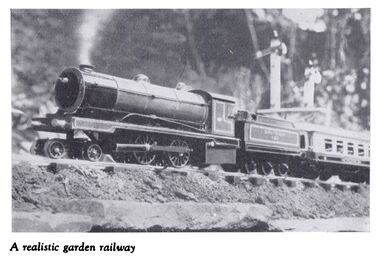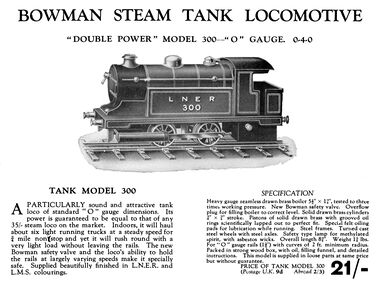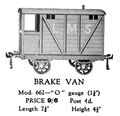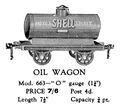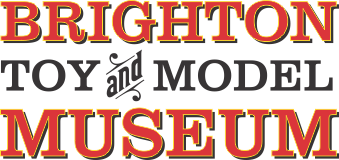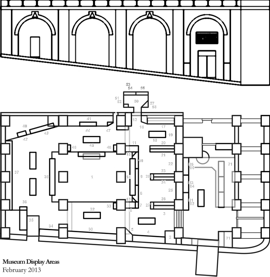Category:Bowman model railways
~1931: "A realistic garden railway", Bowman Models catalogue photograph [image info]
~1931: "The down Express", Bowman Models catalogue photograph [image info]
~1931: Bowman Patent Steel Track [image info]
Bowman Track [image info]
~1931: Bowman model 265 locomotive [image info]
~1931: Bowman model 300 locomotive [image info]
~1931: Bowman model 661 Open Wagon [image info]
~1931: Bowman model 664 Timber Wagon [image info]
Bowman's small range of model railway equipment was distinguished by it's deliberately oversized gauge 1 superstructure running on Gauge 0-sized track. Since Bowman's locomotives were all steam -powered, this mix of scales allowed the combination of brutishly robust, solid-running and almost indestructable steam locomotives with the most common interwar track size.
Track
Bowman's track was also suitably heavy-duty, with creosoted wooden sleepers that had a small central hole to allow the track to be screwed or nailed down.
Bowman Patent Steel Track / Thick steel and wood -- Rigid - immovable - resists wear and weather
The Track you can walk on!
THIS Track is a practical attempt to produce a really hard-wearing, weather-resisting track within the reach of all. Like most Bowman productions, strength and solidity are its distinguishing features. In spite of its low price, it has a good scale model appearance, the sleepers being evenly spaced throughout the length of the track, including joints, thereby giving an appearance similar to the very expensve scale model tracks available.
Absolute rigidity and strength is secured by the heavy steel plate rails and creosoted wooden sleepers. Special catches lock all joined ends securely together, and holes are provided in sleepers for screwing or pinning to ground.
For running qualities this track is fully equal to the most expensive rails on the market. The securely wedged wooden sleepers deaden all "tinny" noises and smooth, quiet running is the result. The Bowman Track can be adapted for use with the usual standard "0" gauge tin-plate points.
Garden railways
The oversized locos and rolling stock (on the company's heavy-duty weatherproof gauge 0 track) was particularly useful for garden railways where space was limited, since it combined a relatively small and flexible track gauge (with fairly tight turning circles) with trains that would normally be associated with larger and more awkward track. Steam power also meant meant that a Bowman garden railway didn;t care too much about whether there was a tiny amount of dirt of the rails that might break the contact of an electrically powered locomotive, or whetehr there were any electrical shorts - a Bowman model railway could even run in the rain!
THE THRILL OF A REAL STEAM RAILWAY
The railway has perhaps always held the greatest appeal and many of our finest engineers spend many happy hours of their spare time making and running small model steam trains. Sir Henry Seagrave, the speed wizard of the motor world, had a delightful model railway in his garden, and was one of the many notable men who make this their hobby.
The coming of Bowman Steam Locomotives opened out a new era in this fascinating pastime as for the first time prospective model engineers were able to satisfy their natural craving for realism at a price within their reach. For as little as 21/- they could now buy British-made steam locos of good appearance, real hauling power and great mechanical strength – locos that would steam up to 1½ miles on one filling, drawing a load of heavy coaches over six feet long! In fact it became possible for the average youth to possess, not a toy, but a real model railway such as experienced model engineers are proud to own. It offered to all ages a new and wonderful pastime, thrilling, inexpensive and instructive.
Scale issues
Massive Proportions of BOWMAN STEAM LOCOS
Bowman Models were the originators of the new oversize "O" gauge for locomotives and rolling-stock and it has proved to be a very popular innovation. The difference in scale proportion is so small as to be unnoticeable, whereas the model engineer is now able to have all the advantages of large massive engines and coaches of nearly "1" gauge scale with the cheapness of "0" gauge. All Bowman locos run on any standard "0" gauge track though, on account of its solidity and smoothness of running, Bowman Steel Track is specially recommended.
The comparatively small wheels did sometimes become an issue on the very smallest 0-4-0 Bowman locos, which had a tendency to spin their wheels if hooked up to too many carriages.
Customisation
The solidity of construction meant that the larger Bowman locos could be "hacked" to create other loco types – for instance, a 234 without tender could be modified and fitted with a small dummy coal bin and side tanks and turned into a reasonable reproduction of one of the big Southern tank engines.
See also:
Pages in category ‘Bowman model railways’
The following 5 pages are in this category, out of 5 total.
Media in category ‘Bowman model railways’
The following 21 files are in this category, out of 21 total.
- Bowman carriage 17172 detail.jpg 1,600 × 1,200; 1.05 MB
- Bowman LNER 300, Black Cat Cigarettes (HW 1932-12-017).jpg 2,351 × 3,000; 2.09 MB
- Bowman Loco 234 running instructions, pages 1, 4 (Bowman Models).jpg 1,800 × 1,369; 1.81 MB
- Bowman Loco 234 running instructions, pages 2-3 (Bowman Models).jpg 1,800 × 1,369; 1.93 MB
- Bowman Loco 234.jpg 1,086 × 672; 103 KB
- Bowman Patent Steel Track (BowmanCat ~1931).jpg 2,200 × 1,517; 1.05 MB
- Bowman Patent Steel Track.jpg 1,800 × 1,311; 735 KB
- Brake Van, Bowman Models 662 (BowmanCat ~1931).jpg 1,358 × 1,309; 545 KB
- Express Passenger Train Set, Bowman Models 23455 (BowmanCat ~1931).jpg 3,000 × 967; 826 KB
- Goods Train Set, Bowman Models 26566 (BowmanCat ~1931).jpg 3,000 × 1,181; 963 KB
- Junior Tank Loco (Bowman Model 410).jpg 2,660 × 2,124; 1.33 MB
- LNER Passenger Coach 11652, Bowman Models 551 (BowmanCat ~1931).jpg 2,903 × 1,985; 1.65 MB
- Open Wagon, Bowman Models 661 (BowmanCat ~1931).jpg 1,316 × 1,045; 381 KB
- Realistic Garden Railway, Bowman Models publicity photo (BowmanCat ~1931).jpg 2,288 × 1,545; 1.78 MB
- Shell Motor Spirit Oil Wagon, Bowman Models 663 (BowmanCat ~1931).jpg 1,346 × 1,205; 441 KB
- Shell Oil Tanker (Bowman Models 663).jpg 1,200 × 900; 711 KB
- Steam 0-4-0 Tank Locomotive, Bowman Models 265 (BowmanCat ~1931).jpg 3,000 × 2,246; 2.27 MB
- Steam 0-4-0 Tank Locomotive, Bowman Models 300 (BowmanCat ~1931).jpg 3,000 × 2,246; 1.99 MB
- Steam 4-4-0 Express Locomotive, Bowman Models 234 (BowmanCat ~1931).jpg 3,000 × 2,311; 2.92 MB
- The Down Express, Bowman Models publicity photo (BowmanCat ~1931).jpg 2,350 × 1,808; 1.88 MB
- Timber Wagon, Bowman Models 664 (BowmanCat ~1931).jpg 1,320 × 1,045; 349 KB
